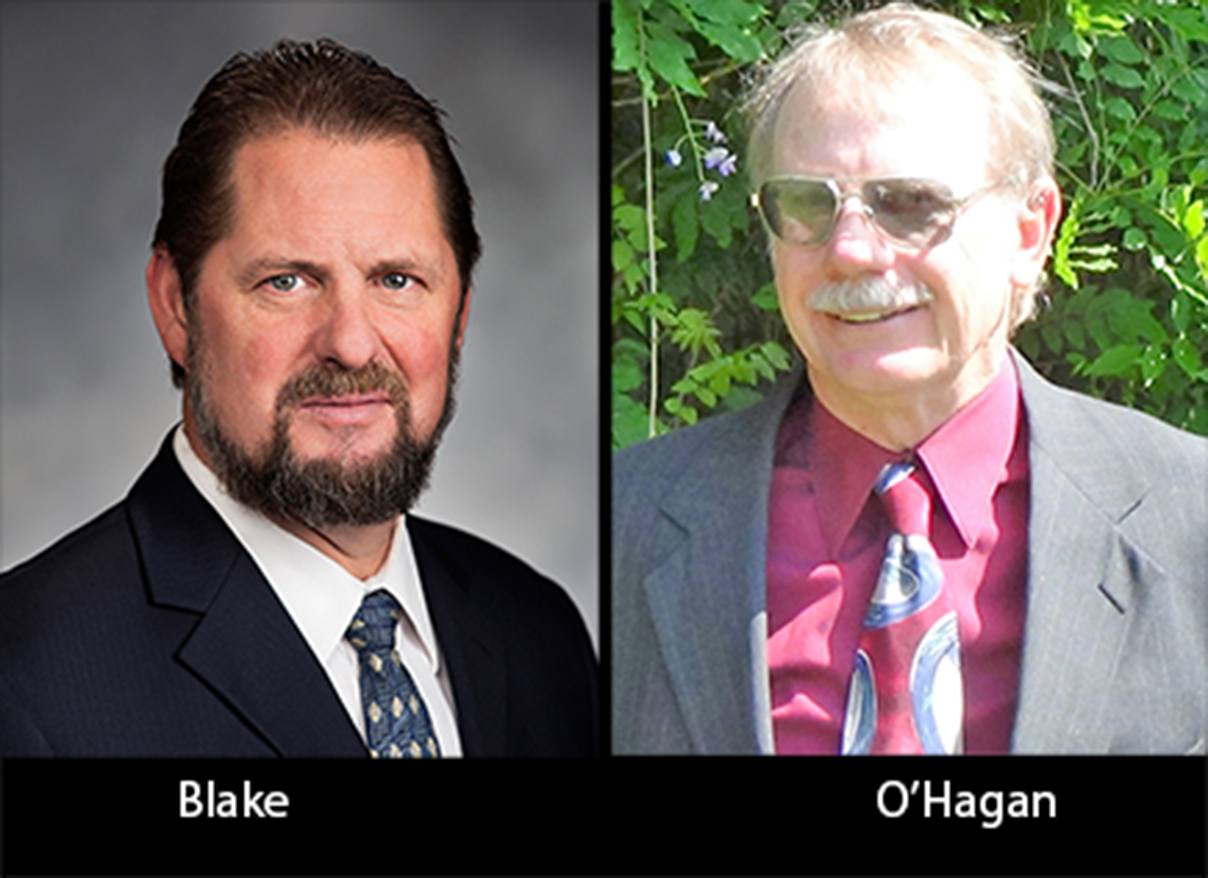Washington State Rep. Brian Blake sees economic betterment for the 19th Legislative District through such acts as infrastructure improvements and restoring salmon runs.
Blake, a Democrat from Aberdeen, first assumed the position 2 office by appointment in 2002 and is being challenged by Jimi O’Hagan, a cranberry farmer from Grayland.
O’Hagan is a Republican who has identified in the past as an Independent or constitutionalist and refers to himself as a “non-politician.” He believes the root of many of the state’s problems, including economic ones, is that attorneys are allowed to serve in the state’s legislative and executive branches of government, giving the judicial branch of government too much power.
Both candidates want to see the state’s budget balanced and K-12 education adequately funded because the system functions as infrastructure that is important to the economy.
Blake expects much of this legislative session will be devoted to figuring out how to comply with the state Supreme Court’s mandate in the McCleary case, which requires the state to fund education at a higher rate and come up with a revenue plan creating uniformity in revenue collection. Property tax levies are currently a key component of school funding, but levy rates vary substantially from one community to the next, with rural areas typically paying a higher rate than large urban areas.
“Reforming compensation issues? That’s going to be a difficult bargain,” Blake said. “But it needs to be done because people in rural communities have much higher levy rates. … Levy reform will help rural school districts.”
O’Hagan, however, said the McCleary decision was improper and another reason why legislators shouldn’t have ties to the judicial branch. It’s one result of the “violation of the separation of powers by the judicial branch,” he said. “Eliminate the corruption, dishonesty and deceit in government instead — and then we’ll have more money for education.”
Blake is chairman of the House Agriculture and Natural Resources Committee. He hopes his efforts to restore salmon runs will continue moving forward and increase hatchery production.
O’Hagan has said he wants to fully support all of the fisheries in the state.
Both also noted that rural needs are often ignored in Olympia.
Blake wants to continue moving forward on establishing a permitting process that don’t impede business. Finding ways to make things easier for farmers and the shellfish industry are among his priorities for the upcoming session if he is re-elected.
“Small forest landowners have lost the ability to access their assets. There is a compensation program in the capital budget but it hasn’t been fully funded,” Blake said.
But ensuring recreational access to state public lands is also important, Blake noted.
O’Hagan again points to judicial influence in state government as playing a significant part in rural issues not being addressed. He referred to the judiciary as an “industry that is very beneficial to urban areas.” In rural areas, however, access to public areas has been sharply curtailed so people with the fewest means have trouble accessing locations they were able to use in the past, he said.
“People in urban areas don’t understand the way the timber tax is designed” and the lack of understanding has affected the rural areas economically and socially, O’Hagan explained.
Washington’s timber tax is a 5 percent excise tax based on harvest. Eighty percent of the revenue goes to the county where the timber is harvested and funds capital projects, county roads, libraries, fire districts, voter-approved bonds, school maintenance and operations. The remaining 20 percent goes to the state’s general fund, according to the Department of Revenue.
Both candidates are against the paid land access programs that some large timberland owners have begun charging to hunters and others who want access to the private land.
Replacing and repairing infrastructure is important and Blake said projects that would benefit the 19th District and the surrounding area include finding long-term solutions for coastal erosion in the 19th and 24th districts; obtaining money to pay for stabilizing the Westport Marina; and, improve access to and from Schouweiler Road off the Olympic Highway with acceleration and deceleration lanes.
O’Hagan wants to make it a felony to violate the separation of powers and is targeting state legislators and executives who are also attorneys and judges. People from these professions have written laws that benefit themselves and other special interests, he said. “We would ask them to choose being a politician or state bar member,” he explained. “I think when we do this it would be a more responsible and accountable government.”
O’Hagan wants to revise all state laws as needed to close loopholes, make them clear enough for most people to understand and not require reworking by people with judicial degrees. He said that without state bar membership, he represented his family in a water rights case after Pacific County diverted water from their cranberry farm in the mid-1990s. He said he obtained a judgment, but collecting the judgment has been hampered by legal maneuvers.
Blake, however, thinks just one state division would benefit from a makeover: the Department of Social and Health Services.
“DSHS has become too large and unwieldy. There has got to be a way to break it down and separate it in ways that would increase accountability yet deliver services better,” Blake said. “It provides very important services and we need to find a way to empower employees to reform it from within.”
Washington’s 19th Legislative District covers Pacific and Wahkiakum counties, as well as portions of Grays Harbor, Lewis, and Cowlitz counties.



